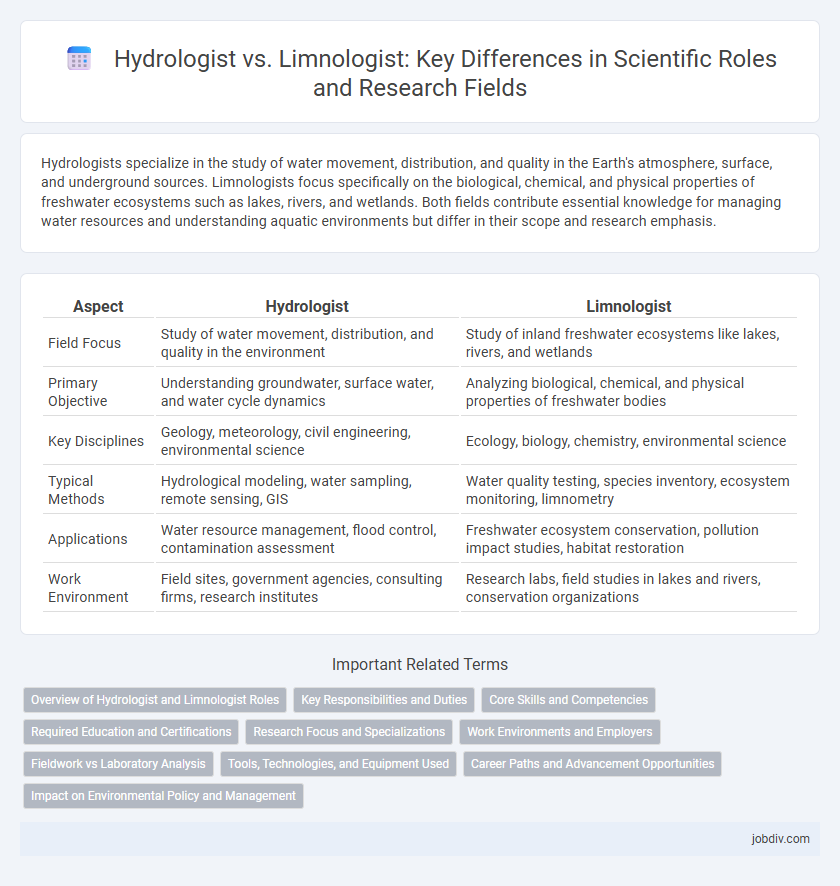Hydrologists specialize in the study of water movement, distribution, and quality in the Earth's atmosphere, surface, and underground sources. Limnologists focus specifically on the biological, chemical, and physical properties of freshwater ecosystems such as lakes, rivers, and wetlands. Both fields contribute essential knowledge for managing water resources and understanding aquatic environments but differ in their scope and research emphasis.
Table of Comparison
| Aspect | Hydrologist | Limnologist |
|---|---|---|
| Field Focus | Study of water movement, distribution, and quality in the environment | Study of inland freshwater ecosystems like lakes, rivers, and wetlands |
| Primary Objective | Understanding groundwater, surface water, and water cycle dynamics | Analyzing biological, chemical, and physical properties of freshwater bodies |
| Key Disciplines | Geology, meteorology, civil engineering, environmental science | Ecology, biology, chemistry, environmental science |
| Typical Methods | Hydrological modeling, water sampling, remote sensing, GIS | Water quality testing, species inventory, ecosystem monitoring, limnometry |
| Applications | Water resource management, flood control, contamination assessment | Freshwater ecosystem conservation, pollution impact studies, habitat restoration |
| Work Environment | Field sites, government agencies, consulting firms, research institutes | Research labs, field studies in lakes and rivers, conservation organizations |
Overview of Hydrologist and Limnologist Roles
Hydrologists study the distribution, movement, and properties of water in the Earth's atmosphere, surface, and subsurface environments to manage water resources and predict floods and droughts. Limnologists focus specifically on inland freshwater ecosystems such as lakes, rivers, and wetlands, analyzing biological, chemical, and physical processes to understand aquatic habitats and water quality. Both roles contribute to environmental conservation, but hydrologists address broader water cycle dynamics while limnologists specialize in freshwater ecosystem health.
Key Responsibilities and Duties
Hydrologists primarily study the distribution, movement, and quality of water in the Earth's atmosphere and surface, focusing on groundwater and surface water management to support environmental protection and resource planning. Limnologists specialize in the biological, chemical, and physical properties of freshwater ecosystems such as lakes, rivers, and wetlands, analyzing aquatic organisms and water chemistry to assess ecosystem health. Both scientists conduct field sampling and data analysis, but hydrologists emphasize hydrologic cycle processes, while limnologists target freshwater biodiversity and habitat dynamics.
Core Skills and Competencies
Hydrologists specialize in analyzing water cycle processes, groundwater flow, and surface water distribution, requiring expertise in hydrological modeling, geospatial analysis, and water resource management. Limnologists focus on the biological, chemical, and physical properties of inland aquatic ecosystems, emphasizing skills in aquatic ecology, water chemistry, and environmental monitoring. Both professions demand strong data collection, statistical analysis, and field research competencies to assess and manage freshwater environments effectively.
Required Education and Certifications
Hydrologists typically require a bachelor's degree in hydrology, environmental science, or geoscience, with many positions demanding a master's degree for advanced research roles, alongside certifications such as Professional Hydrologist (PH) from the American Institute of Hydrology. Limnologists usually hold degrees in biology, ecology, or environmental science specializing in freshwater ecosystems, often obtaining certifications like Certified Ecologist (CE) or specialized training in aquatic biology and water quality analysis. Both fields emphasize strong foundations in chemistry, biology, and geology, supplemented by fieldwork experience and proficiency in data analysis software.
Research Focus and Specializations
Hydrologists specialize in studying the distribution, movement, and quality of water in the environment, focusing on surface water and groundwater systems to manage water resources and predict flooding. Limnologists concentrate on inland aquatic ecosystems such as lakes, rivers, and wetlands, analyzing biological, chemical, and physical interactions to understand ecosystem health and biodiversity. Both fields overlap in water science but differ in scope, with hydrologists emphasizing hydrological cycles and water resource management, while limnologists focus on ecological processes within freshwater habitats.
Work Environments and Employers
Hydrologists predominantly work for government agencies such as the U.S. Geological Survey (USGS), environmental consulting firms, and water resource management organizations, conducting field studies and analyzing groundwater and surface water systems. Limnologists are often employed by universities, environmental research institutes, and conservation agencies, focusing their research in freshwater ecosystems like lakes, rivers, and wetlands. Both professionals may collaborate with regulatory bodies and non-profits to address water quality, ecosystem health, and resource sustainability challenges.
Fieldwork vs Laboratory Analysis
Hydrologists primarily engage in fieldwork by measuring surface water flow, groundwater levels, and precipitation to understand the distribution and movement of water in natural environments. Limnologists emphasize laboratory analysis of water samples, examining chemical, biological, and physical properties to study freshwater ecosystems such as lakes and ponds. Both disciplines rely on complementary methods to inform water resource management and ecological assessments.
Tools, Technologies, and Equipment Used
Hydrologists employ tools such as flow meters, groundwater wells, and remote sensing technologies to measure water movement and distribution across terrestrial environments. Limnologists utilize equipment including water samplers, aquatic microscopes, and submersible probes to analyze chemical, biological, and physical properties of freshwater ecosystems. Both fields increasingly incorporate Geographic Information Systems (GIS) and modeling software for data analysis and environmental monitoring.
Career Paths and Advancement Opportunities
Hydrologists analyze water cycles, groundwater movement, and water quality, often working in environmental consulting, government agencies, or research institutions with opportunities to advance into senior scientist or project management roles. Limnologists specialize in the study of inland aquatic ecosystems such as lakes and rivers, with career paths in academia, environmental monitoring, and conservation organizations, frequently progressing toward specialized research positions or leadership in ecological assessments. Both fields offer interdisciplinary collaboration and potential transitions into policy development or environmental engineering leadership.
Impact on Environmental Policy and Management
Hydrologists provide critical data on water cycle dynamics, groundwater resources, and flood risks, directly influencing environmental policy related to water resource management and disaster mitigation. Limnologists focus on freshwater ecosystems, assessing lake and river health, which supports policies aimed at biodiversity conservation, pollution control, and habitat restoration. Integrating hydrological models with limnological assessments enhances sustainable management strategies for freshwater environments and informs regulations on water quality and ecosystem protection.
Hydrologist vs Limnologist Infographic

 jobdiv.com
jobdiv.com